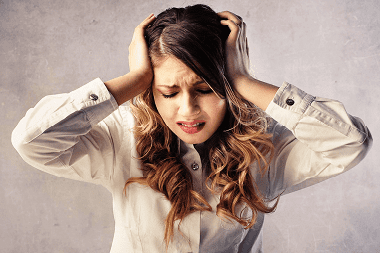Mental health problems >>>> How to deal with a panic attack?
How to deal with a panic attack?

A sudden onset of fear or intense anxiety is called a "panic attack" or "panic attack." Panic attacks in modern psychotherapeutic and neurological practice are usually attributed to neurotic conditions, where the psychological factor is primary, and vegetative - vascular disorders are secondary. In rare isolated cases, panic does not pose a problem for a person, but with frequently repeated panic attacks, we can already talk about panic disorder, which is directly related to mental disorders.
Among the factors provoking a panic attack are:
- Stressful situations (conflicts at work and at home; tragedies (death, accident, illness)).
- Abstract scary events imposed on the psyche when reading books, watching movies, etc.
- Overdose of alcohol, some medicines.
- Hormonal disruptions (with menopause, during pregnancy and the postpartum period, with dysmenorrhea).
- Personality traits (excessive impressionability, the habit of dramatizing, demonstrative behavior, increased anxiety).
Panic builds up gradually, against the background of disturbing thoughts (even if the danger is imaginary), catecholamines (neurotransmitters) are released, which, as a result of a chemical reaction, lead to the formation of adrenaline, which narrows the blood vessels and thereby increases blood pressure. The heartbeat speeds up, followed by increased breathing, which leads to hyperventilation, changes the gas composition of the blood and causes dizziness. In the brain, neurotransmitters provoke the excitability of neurons, which increases the feeling of fear and panic reaches its climax.
A panic attack is usually accompanied by a number of disturbances in well-being that can be seen as signs of panic:
- Violation of the rhythm of breathing,
- Spasm of the esophagus and, as a result, difficulty swallowing,
- Increased heartbeat,
- Flushed face,
- Increased blood pressure,
- Dizziness,
- A fit of nausea
- Limb tremors,
- Increased sweating,
- Chills,
- Impaired clarity of thought.
To cope with an attack of panic, it is necessary to learn how to control the process of growing anxiety in time, to slow down the launch of a mechanism that enhances the panic state. The ability of a person to relax in time (relax the muscles) and switch attention from the stress factor to neutral events (learn to forcefully change the train of thought from anxious to everyday ones) is of great importance in preventing an anxiety attack. People who are prone to panic attacks are advised to monitor the rhythm of breathing at moments of increasing anxiety, not to let it go astray, to breathe shallowly (not deeply) in order to prevent hyperventilation and subsequent brain reactions.

Read

Read



























